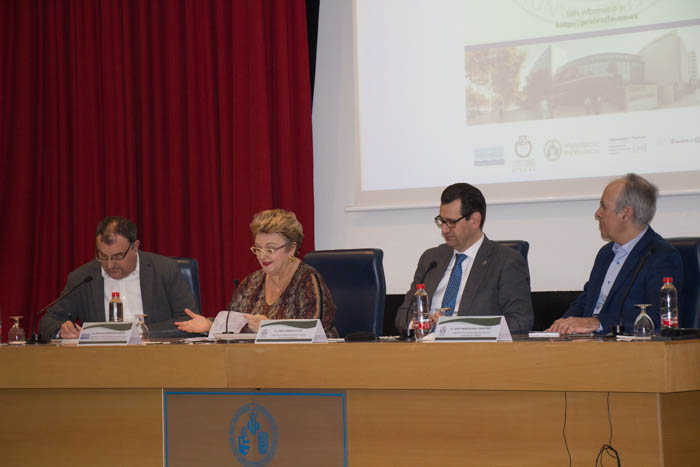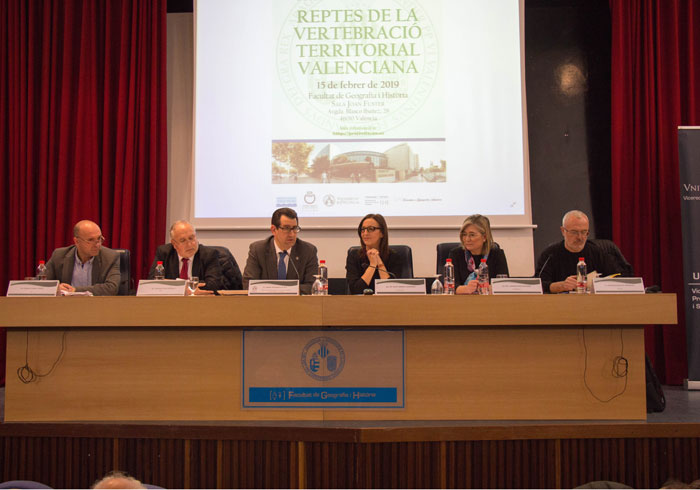
On Friday, February 15, the Faculty of Geography and History has hosted the annual conference between the Universitat de València and the Institutes of Regional Studies (IDECOS), which has been focused on the challenges of Valencian territorial structure. 200 people have attended this conference, which celebrates its 8th edition.
This conference between the Universitat de València and the Institutes of Regional Studies celebrates its 8th editionthis year, a fact that ‘shows the close relationship between the Universitat de València and the Institutes of Regional Studies (FIECOV), between the university community and the main centres who support the cultural awareness of the Valencian territory’, has explained Jorge Hermosilla, the Vice-Principal for Territorial Projection and Society. He has inaugurated the congress at the Faculty of Geography and History accompanied by the vice president of the Diputación de Valencia, Mercedes Berenguer; the dean of the Faculty of Geography and History, Josep Montesinos; and the president of FIECOV, Josep V. Frenchina. Deputy Mercedes Berenguer has praised the congress for giving the opportunity to share the views of the academic, political and local spheres. The dean has highlighted the collaborative will of the different institutions in favour of society. The president of FIECOV has emphasised the necessity to ‘rethink the organisation of the territory in order to be able to overcome the problems that threaten its sustainability’.
The first four lectures have been given by the teaching staff of the Universitat de València. Professor in Geography Julia Salom has focused on the ‘chance’ that comes from the implementation of the Plan de Acción Territorial de las Comarcas Centrales Valencianas, a plan to ‘pick up a support and reassessment strategy in these regions that will favour territorial rebalancing and will generate a more sustainable development model’. Professor Javier Esparcia (Geography Department) has defended the need to take action in the fight against rural depopulation and has insisted on the significance of prioritising ‘where, how and when to act’. Lecturer Joan Carles Membrado (Geography Department) has tackled the complexity of the Valencian territory and has claimed that ‘in order to meet the reality of the territory, which is diverse and unpredictable, it should come from a flexible local administration in body and delimitation’. Finally, lecturer Joan Sanchis (Department of Applied Economics) has explained that the Valencian Community ‘has been a pioneer and is now deploying an ambitious programme of territorialisation of occupation proactive policies’. He said the main obstacles are ‘the lack of regional structure and the existing difficulties in the consolidation of a new lateral governance that is effective and flexible’.
The first round table, called La organización del territorio desde la perspectiva política, has been moderated by the Vice-Principal Jorge Hermosilla and other representatives from the main political parties. Mª Josep Amigó (Compromís) has claimed provincial governments are ‘dispensable and more work should be done in order to diminish their power so that they can be eliminated in the future’. Mª Carmen Peris (Citizens) has also interceded for the elimination of the provincial governments and has explained that ‘the service these institutions provide could also be ensured by the ministries in order to eliminate duplicities’. Evarist Aznar (PP) has expressed his disagreement, since he is against the elimination of provincial governments: ‘if we already have a framework, why are we going to make another one that will load ministries with more work? Keeping the ones we already have is more effective, because the role of provincial governments and public services is very necessary’. Antonio Montiel (Podemos) has claimed provincial governments are a series of structures inherited by a certain model of State that should be revised and has stood up for ‘a simpler territorial organisation, because usually the simplest thing is also the most effective for all citizens’. Antoni Such (PSPV) has defended the need to ‘remodel the legislation and the Constitución in order to achieve a Valencian Community that will have a good territorial structure according to the needs and aspirations of the Generalitat Valenciana’. Rosa Pérez (United Left) was also invited to the table, but couldn’t attend.
The conference has carried on in the afternoon in a round table about the challenges of the Valencian territorial structure. The president of FIECOV, Josep Vicent Frechina, has moderated the debate between representatives of the Institut d'Estudis Territorials del Caroig (IETEC), the Institut d'Estudis de la Vall d'Albaida (IEVA), the Centre d'Estudis i Investigacions Comarcals “Alfons el Vell”, the Institut d'Estudis Comarcals de la Foia de Bunyol-Xiva, Institut d'Estudis Comarcals de la Marina Alta (IECMA) and the Institut d'Estudis Comarcals de l'Horta Sud.
The conference, that has celebrated its 8th edition this year, is organised every year by the office of the Vice-Principal for Territorial Projection and Society and the Institutes of Regional Studies, in collaboration with the Diputación de Valencia.












